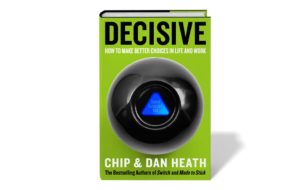Instinctive reactions are kind of like the “door close” button on an elevator: useless.
Not too long ago, I agreed to set up a meeting with someone, only to have him call and cancel as I was pulling into the parking garage. I left class early to make it there on time and I woke up an hour earlier to fit it in my schedule. Was it acceptable to be annoyed and frustrated? Probably. My pouting lasted about an hour, after which I moved on with the rest of my day. I actually forgot about the incident until just now when I needed to think of an example of a useless, instinctive reaction.
But that’s the point.
Looking back, we realize that so much time is squandered giving in to situations and people that have absolutely no effect on our future – we often can’t even remember what we were mad about yesterday. So why do we still let ourselves ruin the present moment? The answer probably lies in some physiological explanation of reactions that I’m unqualified to write about. But there is a tool we can implement to keep our short-term emotions under control.
The 10/10/10 rule asks us to evaluate our reactions using three different time frames:
How will you feel about it 10 minutes from now?
How about 10 months from now?
How about 10 years from now?
I first learned about 10/10/10 through Chip and Dan Heath’s book Decisive: How to Make Better Choices in Life and Work. And while this strategy was originally intended to help people make better decisions about their health, jobs, and finances, I’ve found that 10/10/10 is equally helpful for less tangible situations. For example: How  will you feel about the guy who cut you off in traffic in 10 minutes? 10 months? 10 years?
will you feel about the guy who cut you off in traffic in 10 minutes? 10 months? 10 years?
It may seem ridiculous, but it forces us to look at our daily decisions as investments instead of letting people and events arbitrarily dictate our feelings. It helps you realize how trivial 99% of problems truly are. Realizing that in a matter of days you’ll almost never remember that thing that’s currently draining your energy and wellbeing is an ultimately liberating feeling.
One of my favorite authors, Anthony de Mello, sums up this concept much more eloquently:
“Life is infinitely greater than this trifle your heart is attached to and which you have given the power to so upset you. Trifle, yes, because if you live long enough a day will easily come when it will cease to matter. It will not even be remembered – your own experience will confirm this. Just as today you barely remember, are no longer the least bit affected by those tremendous trifles that so disturbed you in the past.”
The best part of 10/10/10 is that it’s so dynamic. Considering the three time frames can be applied to virtually every decision. Will you regret spending hundreds of dollars on shoes ten years from now? Will you still be upset about a breakup with your girlfriend/boyfriend in a decade? Is it worth getting mad over a text or Snapchat that you won’t remember in 10 minutes, much less 10 years?
Spare your day’s worth of mental energy for the things you actually value.
Short term emotions are a deterrent to rational thinking. And while conducting a 10/10/10 analysis doesn’t guarantee that the long-term perspective is the right one, it does guarantee that your short-term emotion isn’t the only voice at the table.
Dominic Vaiana studies writing and media strategy at Xavier University. His personal articles, essays, interviews, and book recommendations are sent in his monthly newsletter.
